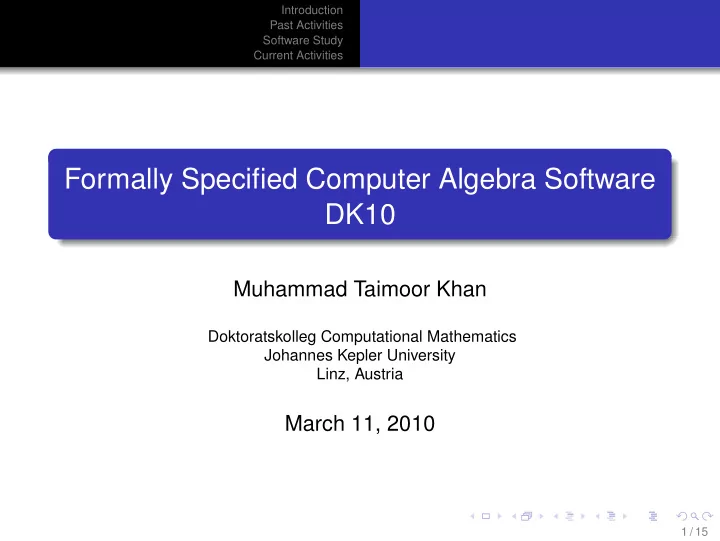

Introduction Past Activities Software Study Current Activities Formally Specified Computer Algebra Software DK10 Muhammad Taimoor Khan Doktoratskolleg Computational Mathematics Johannes Kepler University Linz, Austria March 11, 2010 1 / 15
Introduction Past Activities Software Study Current Activities Outline Introduction 1 Past Activities 2 Software Study 3 Current Activities 4 2 / 15
Introduction Past Activities Software Study Current Activities Introduction Project goals Formal specification of programs written in untyped computer algebra languages Especially to find errors/inconsistencies for example violation of method preconditions Computer algebra software at RISC as examples DK11: rational parametric algebraic curves (Maple) DK6: computer algebra tools for special functions in numerical analysis (Mathematica) DK1: automated theorem proving (Mathematica) 3 / 15
Introduction Past Activities Software Study Current Activities Past Activities (October 2009 to February 2010) Course work Computer Algebra Automated Theorem Proving Formal Methods in Software Development Thinking, Speaking, Writing Formal Methods Seminar Programming Project Literature study Type systems Polymorphism Abstract data types Denotational semantics Functional programming languages Pattern matching Type checking and inference 4 / 15
Introduction Past Activities Software Study Current Activities Software Study - Computer Algebra Bivariate difference-differential dimension polynomials and their computation Relative Gröbner bases computation (using M. Zhou and F . Winkler’s algorithm) Maple implementation of the algorithms Software Maple package DifferenceDifferential Christian Dönch Literature reference Christian Dönch. Bivariate difference-differential dimension polynomials and their computation in Maple . Technical report no. 09-19 in RISC Report Series, University of Linz, Austria, 2009. 5 / 15
Introduction Past Activities Software Study Current Activities Software Study - Computer Algebra ddsub := proc ( c,b ) local f, g, i, m, n, a1 ; f := c ; g := b ; for i to nops ( g ) do g [ i ][1] := - g [ i ][1]; f := [ op ( f ), g [ i ]]; end do ; for m from nops ( f ) by -1 to 1 do for n from m-1 by -1 to 1 do if f [ m ][2]= f [ n ][2] and f [ m ][3]= f [ n ][3] and f [ m ][4]= f [ n ][4] then a1 := f [ m ][1]+ f [ n ][1]; f [ n ] := subsop (1= a1 , f [ n ]); f := subsop ( m = NULL , f ); n := m ; end if ; end do ; end do ; .... return f ; end proc ; 6 / 15
Introduction Past Activities Software Study Current Activities Software Study - Computer Algebra Potential considerations Limited types used i.e. integer and list Not much use of Maple libraries - mostly standalone No destructive update of data structures Imperative style of development Procedural/functional Maple package 7 / 15
Introduction Past Activities Software Study Current Activities Software Study - Algorithmic Combinatorics Advanced applications of holonomic systems approach Computations in Ore algebras Non-commutative Gröbner bases Solving linear system of differential equations Software Symbolic summation and integration for holonomic functions Mathematica package - HolonomicFunctions Christoph Koutschan Literature reference Christoph Koutschan. HolonomicFunctions (User’s Guide) . Technical report no. 10-01 in RISC Report Series, JKU, Austria, January 2010. Christoph Koutschan. Advanced Applications of the Holonomic Systems Approach . RISC-Linz, JKU. PhD Thesis, September 2009. 8 / 15
Introduction Past Activities Software Study Current Activities Software Study - Algorithmic Combinatorics OrePlus [ p1 :OrePolynomial[ data1_List, algebra_OreAlgebraObject, order_ ], p2 :OrePolynomial[ data2_List, algebra_OreAlgebraObject, order_ ]] := Module[{i1, i2, l1, l2, c, c1, c2, m1, m2, sum, coeffPlus}, l1 = Length[ data1 ]; If[l1 === 0, Return[ p2 ]]; l2 = Length[ data2 ]; If[l2 === 0, Return[ p1 ]]; coeffPlus = algebra [[3]]; i1 = 1; i2 = 1; sum = {}; While[i1 < = l1 && i2 < = l2, {c1, m1} = data1 [[i1]]; {c2, m2} = data2 [[i2]]; If [m1 === m2, c = coeffPlus[c1, c2]; If[Not[MatchQ[c, 0|0.]], AppendTo[sum, {c, m1}]]; i1++; i2++; , If[OreOrderedQ[m1, m2, order ], AppendTo[sum, {c1, m1}]; i1++; .... ];]; 9 / 15
Introduction Past Activities Software Study Current Activities Software Study - Algorithmic Combinatorics Potential considerations Based on pattern matching Imperative style of programming Use of abstract data types Use of customized Mathematica functionality Not much use of Mathematica libraries Procedural/functional Mathematica program with abstract data types 10 / 15
Introduction Past Activities Software Study Current Activities Software Study - Automated Theorem Proving Theorema set theory prover (STP) Automated prover for theorems Works with Prove-Compute-Solve (PCS) strategy Integrated with Theorma infrastructure (not standalone) Software Mathematica package SetTheory‘Prover‘ Wolfgang Windsteiger Literature reference W. Windsteiger. An Automated Prover for Zermelo-Fraenkel Set Theory in Theorema . JSC 41(3-4), pp. 435-470, 2006, Elsevier, ISSN 0747-7171. W. Windsteiger. A Set Theory Prover in Theorema: Implementation and Practical Applications . RISC. PhD Thesis, May 2001. 11 / 15
Introduction Past Activities Software Study Current Activities Software Study - Automated Theorem Proving STP[ • lf[ l_ , T_ ∈ Intersection[ A_ , B__ ], i_ ], a_ • asml , af_ ]:= Module[ {goalList=MapIndexed[ • lf[NewLabel[ � c MembershipAlternatives, l , # 2 ], T ∈ # 1 , i ] & , { A,B }],proofSits}, proofSits=Map[Psit[ # , a , af ] & ,goalList]; ProofStep[Prinfo[ � c MembershipFiniteIntersection, l ,goalList], Sequence @@ proofSits]] 12 / 15
Introduction Past Activities Software Study Current Activities Software Study - Automated Theorem Proving Potential considerations Pattern matching rules used Are the rules overlaping? Are the rules exhaustive? Implicit type definitions Declarative style of programming Functional Mathematica program, essentially based on pattern matching 13 / 15
Introduction Past Activities Software Study Current Activities Current Activities Definition of simplified/typed versions of Mathematica and Maple (say MiniMma and MiniMaple ) Syntax Type system Semantics and soundness of typing Implementation of a type checker prototype Static typing as a prerequisite to logic specification Experiments with software fragments available at RISC Next - Formal Specification language 14 / 15
Introduction Past Activities Software Study Current Activities Thanks for your attention! 15 / 15
Recommend
More recommend